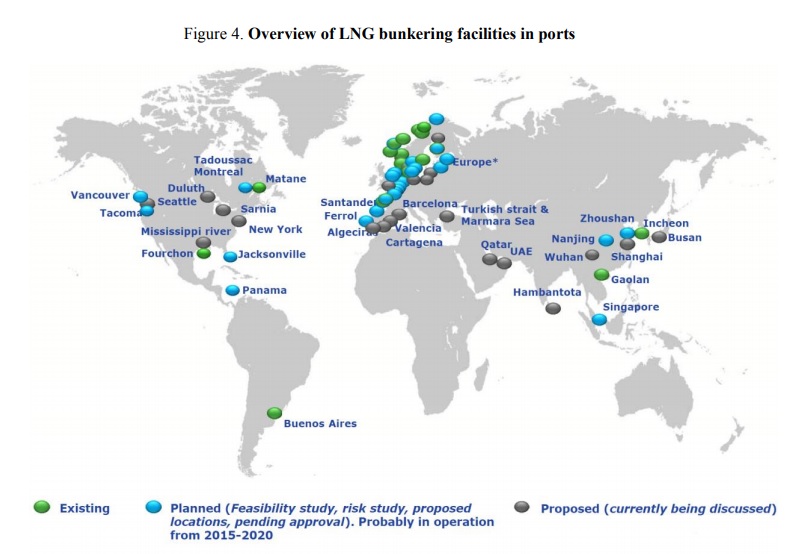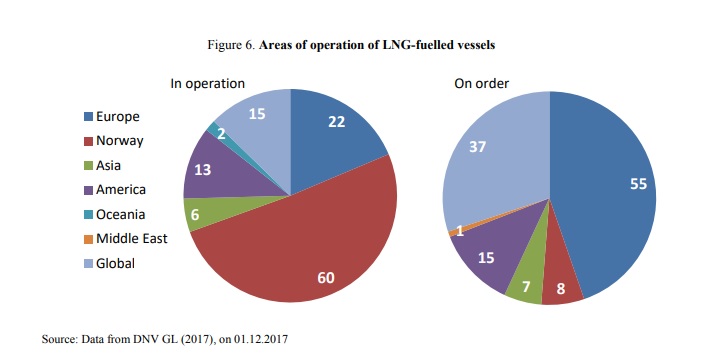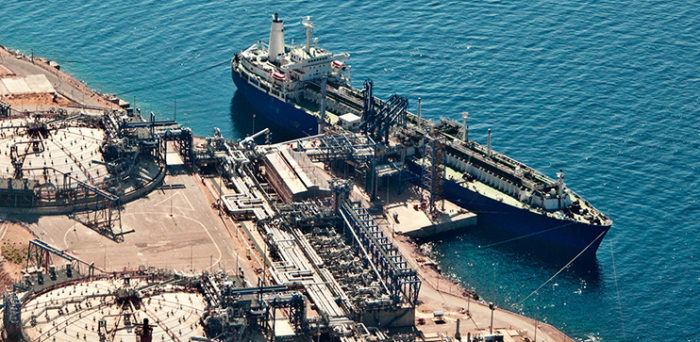As the uptake of LNG as marine fuel is expected to rise in the coming years, new LNG facilities are required worldwide and Japan is positioning itself as a potential hub in Asia for LNG refueling. International Transport Forum at the OECD issued a report assessing the factors that will influence the realisation of this ambition, that would make Japan one of the key places in Asia where LNG-fueled or co-fueled ships would be able to take onboard LNG.
According to the study, the success of this strategy will depend on four conditions:
- Uptake of LNG as ship fuel: There are currently 118 LNG fueled vessels in the world, however, the number is growing and will almost double by 2020, based on ship order data. The recent order by container line CMA CGM of nine LNG-enabled mega-container ships is likely to be followed by similar orders from other lines. This would increase the prospects for bunkering of LNG-fueled ships on main East-West trade lanes. Competitive LNG prices can further incentivise alternative fuel investment strategies by firms.
- Availability of LNG bunkering facilities worldwide: Ship-owners and operators will need a network of ports where they can take on board LNG. These facilities are becoming increasingly available in Europe, and to a lesser extent in North America and Asia.
- Recent and future emissions regulations: Regulations to reduce SOx and NOx emissions from ships have increased demand for alternative propulsion options, including LNG. In particular, the stricter requirements in ECAs as of 2015 have boosted LNG-fueled coastal shipping in Northern Europe and North America. The global sulphur cap from 2020 will likely drive the use of LNG fueled ships in other parts of the world as well.
- Strategic location close to trade routes: Major Japanese ports could benefit from increased LNG fueled container ship traffic because of their geographic situation. The Port of Keihin (Yokohama, Tokyo and Kawasaki), which has developed the technical and infrastructure requirements for LNG bunkering, is located at one end of the North Pacific trade route as a first port for loading and unloading. This gives it a locational advantage to become a major LNG bunkering hub.

The ITF OECD suggests that Japan has the potential to become a major LNG bunkering hub, with some uncertainties though:
Emission regulations have so far focused on reducing SOx and NOx emissions from ships, but will soon target GHG emissions as well. In that context, LNG has advantages over conventional fuels but is not the ideal solution to reduce CO2 emissions from ships. It can cut them by around 20%, but there is “methane slip” (releases of methane from unburnt gas in engine exhaust). Also, handling LNG at each stage of the supply chain leads to fugitive emissions. Global standards on the safe handling of LNG on the shore side will also be required.
The analysis confirms the strategic importance for Japan to invest in LNG bunkering facilities in anticipation of the 0.5% global sulphur cap. The sulphur regulations in the Emission Control Areas in Northern Europe have generated orders and deliveries for LNG-fueled ships operating in coastal trades. With the sulphur cap imminent, this might also happen in Japan.
Given its current level of infrastructure, experience and geographical position, Japan will most likely secure a competitive advantage vis-à-vis other Asian ports that are developing similar bunkering facilities for LNG. With these in place, the ports in the Tokyo Bay area in particular will strengthen their current position as key regional and international ports and enable the emerging East-West traffic by LNG-fueled ships traffic to trade in Japan.

Recommendations
- Involve stakeholders in the development of policies governing LNG bunkering
Japan has a range of players with a stake in the development of LNG bunkering. These include LNG importers, global and coastal shipping companies, as well as firms with a high degree of expertise in storage and handling of LNG. Japan’s LNG bunkering strategy can be successful if it builds on the experience of these stakeholders while stimulating competition in the Japanese LNG market.
2. Plan LNG infrastructure in a flexible manner
The uptake of LNG propulsion by the shipping sector is increasing, but its perspectives are far from certain. In order to avoid over-investment, the LNG bunkering strategy should be flexible and able to scale up when demand grows. New storage facilities and gas infrastructure should thus be able to accommodate a range of gases, such as bio-methane once they become a viable option.
3. Stimulate international cooperation in LNG bunkering services
Increasing the number of LNG-propelled vessels significantly requires a world-wide network of LNG bunkering facilities. Japan has been active in international coordination efforts, for instance via a Japan-Singapore Summit Meeting in 2016 and a Japan-Singapore Joint Study on LNG Bunkering in 2017. These efforts need to be sustained. Japan could bring together the relevant world ports for LNG bunkering and facilitate the harmonisation of technical standards in LNG bunkering. It could also promote transparent global LNG markets, building on its experience and expertise in handling LNG.
4. Mitigate negative environmental side-effects of LNG-fueled shipping
LNG can reduce the overall GHG emissions of maritime transport. It could increase its contribution to more sustainable maritime transport if operators of LNG supply facilities build on their extensive experience in LNG handling to further minimise the remaining negative impacts, such as fugitive methane emissions and hence the overall greenhouse gas impact of LNG use.
Further details may be found in the following report:































































